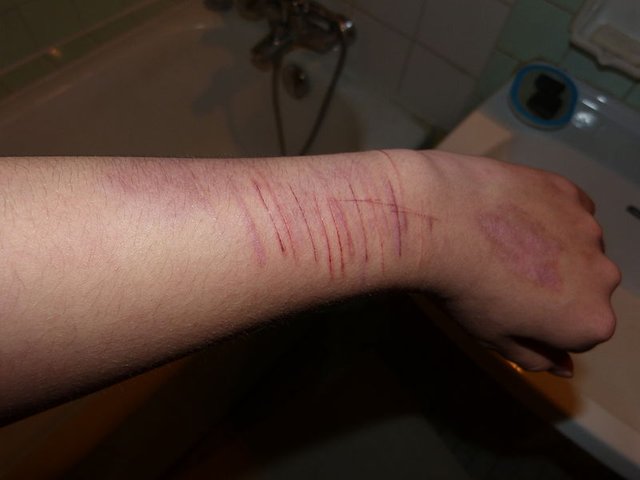Rare Diseases: Münchausen Syndrome
Most of us have heard the term "hypochondriac" being used to describe someone who pretends to have diseases that he does not really have. We believe these people are just being overly dramatic, or we think they are looking for attention, however, hypochondria is a mental disorder as real as schizophrenia (self-promotion, I could not resist myself), paraphilias, or not knowing how to distinguish between "there", "they´re" and "their".
This disorder goes far beyond just pretending to be sick; hypochondriacs are sure of their supposed illness, and there is nothing that can convince them that they are healthier than the doctor evaluating them. They usually interpret normal bodily processes, or non-pathological and unimportant symptoms as signs of a chronic disease, and may even describe such symptoms in great detail in terms of duration and location. They can, for example, come to believe that the non-pathological headaches that are common in many people are a clear sign that they have a deadly brain tumor, and despite dozens of laboratory tests with negative results, be sure of their condition and imminent death, causing great anguish and anxiety (or relief, if you live in Venezuela.)
The management of this type of patients is always difficult; they truly believe that they suffer from a disease, and that it is the doctor´s fault that it cannot be detected. In addition, due to the non-detection of the illness they claim to have, it is common for them to develop concomitant anxiety or depression disorders. However, there are certain treatments that can be effective, such as cognitive-behavioral therapy, the use of psychotropic drugs, and lately, hyperbaric oxygen therapy (that one where they put you in a capsule and fill you with 100% pure oxygen. Michael Jackson used it, you know the one.). Of course, since our mind is so infinitely complex and vulnerable, hypochondria is not the only disorder in which the patient misdiagnoses himself. There is another one in which the affected person not only thinks he has a pathology, but he actually creates it. I am talking, of course, of the subject of today´s post:
Rare Diseases: Münchausen Syndrome

Before talking about the topic at hand, I must mention, there is the alternative spelling of "Münchhausen", but I know that the double H looks like a typo, and since we all love to criticize, let's leave it with a single H. Münchausen syndrome, also known as factitious disorder, is a chronic psychiatric illness in which the afflicted person, unlike in hypochondria, is perfectly aware that he does not suffer from any pathology (apart from the syndrome itself, of course), but seeks to create illnesses with the aim of generating sympathy and attention from others. They are something like the teenagers of the psychiatric world; substituting Instagram for medical records in which they boast of dramatic and extravagant symptoms, and having the hospital as their place of social recreation.
Leaving the jokes aside for a few moments, this syndrome can have very serious manifestations: patients that cause damage to themselves, injecting bacteria to produce infections, hitting themselves to cause bleeding, or even self-amputating entire limbs. They enjoy the medical attention they receive for their injuries or symptoms, and always present themselves willing to receive painful or experimental treatments, or invasive surgical procedures, all without the intention of receiving drugs or monetary benefits. In addition to self-mutilation, they can also fake a wide variety of non-related symptoms, such as nausea, paralysis, muscle weakness, amnesia, epileptic seizures, and pain anywhere in the body, which can be so convincing that doctors prescribe a lot of drugs that end up causing real damage to their physiology.

Within the medical environment they are referred to as "Pilgrim Patients", going from hospital to hospital, supposedly suffering from a large number of unrelated symptoms, with the most dramatic manifestations occurring only in private, with no one to see them apart from themselves (what a coincidence, right?). They usually have ample medical knowledge due to their continuous visits to health centers, and they are very willing to take tests of all kinds, and when they turn out to be negative they begin to feel a worsening of the symptoms.
Its causes are unknown, although it is known that it goes beyond a simple simulation with the intention of deceiving others, and their motivations for seeking attention are mostly unconscious and obscure. It is clearly linked to previous traumas; there may be a history of emotional or physical abuse, or of having suffered a serious illness during childhood. It is known that they present problems of self-esteem and identity, poor control of impulses, and an altered sense of reality.

In the absence of images of the condition, here is one of the typical reaction when a patient with Münchausen syndrome begins to describe his symptoms.
Due to the nature of the patients who suffer from it, its diagnosis is extremely difficult. It is mainly based on studying their medical history and noticing the lack of relationships between their current and previous symptoms, making a differential diagnosis with several diseases, and studying their response to the treatments that are prescribed. Those afflicted by this syndrome have a history of having visited a large number of health centers without an apparent improvement in their supposed illness, and are reluctant to communicate with their previous treating physicians. It is usually easier to notice the self-inflicted physical symptoms, such as cuts or amputations, but when they feign mental or psychic symptoms it is a real challenge to discover their fictitious nature. How to know if he really presents hallucinations if you cannot trust his word?
Its treatment is often very complicated as well, and rarely successful. Confronting the patient and calling bullshit to his face has no effect, since it only causes them to go to another doctor. They generally reject psychiatric treatment (the only type of treatment that they reject, oh the irony), and they tend to be defensive in the face of psychological approaches. The first step for their proper treatment is to get them to recognize that they have a problem, and thus lay the foundations of a good doctor-patient relationship, to gradually address the problem in a non-confrontational way and without blaming the patient for their condition. It may be tempting to use, let's say, less diplomatic methods, but remember that they usually have access to lawyers, and a lawsuit for hitting a patient looks bad even in the best curriculum. Although, thinking aloud (and in written form), gentle pinching usually leaves no mark. Just saying.

What is the worst that could happen?
It should be noted, there is a variant of this syndrome, called Münchausen Syndrome by Proxy, in which parents or guardians create diseases or mutilations in their children, or kids under their care. These adults go to the extremes of falsifying medical data and test results, and repeatedly travel to a multitude of care centers seeking help, sometimes even causing real illnesses in children due to excess medication or unnecessary surgical treatment. No jokes in this paragraph, this is just horrible.
It is with patients like these who reject most conventional treatments that we can truly evaluate our medical ethics and humanity; we must remember that behind each disease is a person who suffers from it (oh boy this sound so cliché), and that it is our duty to do everything within our power to help them, even against their own wishes. And you thought that psychiatry was easier than the other specialties, you poor innocent soul.
References:
- Beers, Mark H., et al. The Merck Manuals of Diagnosis and Therapy, 11th ed., 2007.
- Münchausen Syndrome VS Hypochondria
Hello @mike961,
Air-Clinic sends her greeting!
We are happy that you are creating amazing medical contents on Steemit using the #Air-Clinic tag.
This article was found as a result of #Air-Curie Initiative! We encourage you to keep it up!
Expect an upvote from @Air-Clinic soon!
If you haven't joined us on Discord please do so by clicking here
Cheers!
Dr. Qamran Bashir- Air-Clinic Curator!
Thanks! I'm glad you guys liked it.
I didn't expect that this exist! What a wonderful article you wrote! I already followed you, hopefully, you will follow me back!
Do you think this kind of disease which encourage the one who affected to be involved in doctor shopping?
It's uncommon on this type of patients; they are usually not interested in drugs and in fact, are generally reluctant to pharmaceutical treatment. They get their kicks from the medical attention alone.
Well was not expecting to find these kinds of diseases thanks for enlightening me.
Solid post.
RE: By Proxy
Namaste, Jaichai